Cute, curly, and just a bit clamorous, Cocker Spaniels are incredibly endearing little pups. Their gentle, affectionate personalities make them great family pets, as they’re usually pretty friendly with children and other animals.
But if you want your little Spaniel to stay healthy and happy, you’ll have to give her a good food, specifically suited to the biological needs of the breed.
Below, we’ll discuss the common health concerns that afflict Cocker Spaniels and the factors you’ll want to consider when choosing a food. We’ll also detail five of the best recipes for the breed and recommend the best available option.
No time to read? See our quick picks here, or keep reading for more detailed reviews.
Quick Picks : Best Dog Food for Cocker Spaniels
- Merrick Grain Free Salmon and Sweet Potato [Best Fish-Based Recipe]! This recipe includes several high-quality proteins, including deboned salmon (the first listed ingredient), salmon meal, whitefish meal, and deboned whitefish.
- Appalachian Valley Small Breed Formula [A Great Overall Pick]. This protein-rich dog food features a variety of healthy ingredients, including venison, lamb meal, duck meal, and ocean fish meal.
- Orijen Regional Red [Highest-Protein Option]. This high-protein, low-carbohydrate recipe is stuffed with nutritious animal protein sources such as Angus beef meat, also includes everything from fresh bison, boar, and lamb, to organ meats like tripe and liver.
- Instinct Original [Best With Raw Pieces]. This grain-free, rabbit-based recipe contains real freeze-dried raw meats in every bite and is made without any artificial flavors, colors, or additives.
- Blue Buffalo Life Protection Formula [Best Budget-Friendly Option]. This affordable lamb-based recipe includes turkey meal as a supplemental protein source, along with healthy. grains like oatmeal and ground barley.
Common Health Concerns For Cocker Spaniels
Whenever possible, it is helpful to address a breed’s health concern through dietary means. But you’ll have to identify those needs first so that you know what to look for when selecting a good food.
Some of the most common problems Cocker Spaniels experience include:
Obesity
Cocker Spaniels love to eat, and they occasionally suffer from weight problems. Overweight and obese dogs are susceptible to a number of different health problems, including joint problems and liver disease, and it can even shorten their lifespan.
Accordingly, you’ll want to ensure your Cocker Spaniel maintains a healthy body weight and that you don’t provide too many treats. Be careful with the people food too: The odd carrot from your dinner won’t cause your pooch to balloon, but if you make a habit of doing so, your pup is likely to pack on the pounds.
Ear Infections
Any dog can suffer from ear infections but those with large, floppy or furry ears are at increased risk. Unfortunately for Cocker Spaniels, their ears are large, floppy and furry, so they suffer from frequent ear infections.
Ear infections occur for a variety of reasons, but yeast infections are one of the most common causes. Yeast infections are typically treated via topical medications, but some vets recommend restricting the amount of carbohydrates in the diet to help prevent these types of infections.
Whether or not carbohydrate limitation helps your pooch avoid ear infections, it is rarely a bad idea to provide dogs with a meat-based diet. Also make sure to clean your Cocker Spaniel’s ears regularly!
Food Allergies
Food allergies occur when your dog’s body overreacts to an otherwise-harmless protein (called an allergen). For example, if a dog is allergic to chicken, her body’s inflammatory response will kick in after she eats a chicken-based diet. This will typically manifest in itchy, irritated skin.
Cocker Spaniels and Cocker Spaniel mixes suffering from food allergies should be fed diets that do not include the offending protein. Just about any protein can trigger a food allergy, but some of the most common allergens include beef, dairy, wheat, egg, chicken, lamb, soy, pork, rabbit, and fish.
Note that not all Cocker Spaniels will develop food allergies, and those that do will be sensitive to different things. Accordingly, there’s no reason to alter your dog’s diet until and unless she is diagnosed with a food allergy by your vet.
Hip Dysplasia
Hip dysplasia is a common joint problem that can afflict any breed, but some – including Cocker Spaniels – are at higher risk than others. Dogs with hip dysplasia have improperly formed hip joints, which are frequently quite loose. That allows the legs to move in improper ways, which imparts wear and tear on the cartilage that cushions the joint.
This ultimately results in pain and reduced mobility, among other things. There are a variety of ways to treat (and potentially prevent) hip dysplasia and the associated symptoms, including the use of dietary supplements, such as chondroitin and glucosamine.
Hypothyroidism
Like a few other breeds, Cocker Spaniels are at somewhat higher risk of developing hypothyroidism. Hypothyroidism causes a dog’s thyroid to produce insufficient amounts of the hormones involved with metabolism. This can result in weight gain, lethargy and hair loss, among other symptoms. Dogs with hypothyroidism will require medications for their entire lives, but your vet may recommend specific foods to help treat her symptoms.
For example, it may be necessary to provide your dog with a low-calorie diet to help her lose some weight, or she may need a diet rich in omega-3 fatty acids to prevent the dry skin and coat problems that commonly occur in dogs with this disease. Just be sure to discuss the issue with your vet before switching foods.
Primary Seborrhea
Cocker Spaniels suffer from several different skin ailments, including primary seborrhea. Dogs with this condition often suffer from flaky dandruff and greasy skin, as the condition causes an overproduction of oily skin compounds. The condition can be irritating and lead to secondary infections, so it is important to have it treated promptly.
While a variety of factors can lead to seborrhea, and you’ll need to work with your vet to determine the primary cause, dietary deficiencies can play a role in the disease. Accordingly, you’ll want to ensure you always provide your Cocker Spaniel with a nutritious, balanced diet.

Cocker Spaniels suffer from a number of other health problems that are not related to their diet in any way. Some of the most common include:
Eye Disorders
Cocker Spaniels are susceptible to a variety of eye problems, ranging from cherry eye to ectropion to cataracts. Most of these conditions can be treated with your vet’s help, but some are unfortunately untreatable – cataracts, for example, often result in eventual blindness. Most of these conditions are hereditary in nature, so there’s little you can do to prevent them.
Epilepsy
Epilepsy is thought to occur in about 2 to 4 percent of all dogs, but some breeds – including Cocker Spaniels – suffer from the disease more commonly than others. Afflicted dogs typically suffer from seizures, which can vary from mild to incapacitating.
It is often impossible to determine the reason the seizures associated with epilepsy occur, but your vet may be able to provide medications or treatment strategies to reduce their severity and the frequency with which they occur.
Patellar Luxation
Patellar luxation is a condition in which the kneecap moves out of its proper position. Though to be an inherited condition, patellar luxation typically requires surgery to treat.
Unfortunately, there are no known preventative measures that can help your dog avoid the problem, but it probably doesn’t hurt to ensure your dog’s joints remain healthy, by feeding her a dog food for joint health that’s rich in chondroitin and glucosamine.
Ingredients and Dietary Factors That May Help Common Cocker Spaniel Health Problems
Food should never be considered medicine, but it always makes sense to address as many problems as you can through dietary means. In the case of Cocker Spaniels, this means selecting foods that:
Have an Appropriate Number of Calories
Because Cocker Spaniels are susceptible to weight gain, you’ll want to ensure that the food you give her is suitable for her body size and activity level. Although a variety of factors will determine the amount of energy your canine needs from her food, a 25-pound Cocker Spaniel requires about 780 Calories each day.
Contain Omega-3 Fatty Acids
Dogs need two important types of fatty acids — omega-6 and omega-3 – in their diets. Both are important, but omega-6 fatty acids are pretty common among the ingredients commonly included in dog foods. Therefore, it is important to provide dogs with a food that has plenty of omega-3 fatty acids.
Some of the ingredients that are rich in omega-3 fatty acids include salmon and other fatty fish, flaxseed and some plant oils. Diets rich in omega-3 fatty acids often help to promote healthy skin and good coat condition, and they can also help support joint health and brain development.
Are Fortified with Joint-Supporting Supplements
Cocker Spaniels (and many other breeds that are susceptible to joint problems) will benefit from diets fortified with glucosamine and chondroitin. These supplements, which are included in a number of modern foods, help to sustain and support the cartilage in your dog’s joints, which can help prevent your dog from experiencing pain and reduced mobility.
Are Made without Allergic Triggers
Cocker Spaniels that suffer from legitimate food allergies will typically require a food made without the offending allergen. There are a variety of hypoallergenic foods on the market, which are made without some of the most common allergic triggers, but you may simply be able to avoid some allergens by switching recipes.
For example, dogs who are allergic to chicken may not need a hypoallergenic food; they may just need you to select a beef- or pork-based dog food recipe instead.

Factors to Look For In Any Quality Dog Food
Whether you are trying to feed a Cocker Spaniel or a Cane Corso, you’ll want to look for a few basic features when picking a food. While these shouldn’t be considered individually imperative, you’ll want to select a food that satisfies as many of the following criteria as possible.
A Whole Meat Listed First on the Ingredient List
Dogs are omnivores, but they typically thrive best on meat-based foods. One way to ensure you get a meat-based diet is by looking for foods that have a whole protein at the beginning of the ingredient list. Chicken, beef, pork, salmon, and duck are common whole proteins, but other foods use things like bison, venison or kangaroo.
Meat meals and meat byproducts can also be valuable ingredients, which further elevate a food’s protein content, but it is generally preferable to see a whole protein listed first, with these supplemental proteins occurring farther down the ingredient list.
Manufactured in a Country with High Safety and Quality-Control Standards
It is very important that you provide your dog with only healthy foods, which do not include potentially toxic or dangerous contaminants, so you’ll always want to purchase foods produced in countries with high safety- and quality-control standards. This will also help ensure the product is made consistently, from one batch to the next.
This essentially means selecting only those foods manufactured in the USA, Canada, Western Europe, Australia or New Zealand.
Made Without Improperly Identified Meat Products
Meat meals and meat byproducts are perfectly acceptable, nutritious and palatable items manufacturers often include in dog foods. But it is very important that they are only comprised of proteins derived from safe sources. You don’t want foods that include meat meals made with road kill or other types of unsavory meats.
To do so, you’ll want to ensure that you avoid foods with improperly labeled meat meals and byproducts. Stick with foods that contain things like “pork meal” or “chicken byproducts,” rather than vaguely identified ingredients, such as “meat meal” or “poultry byproduct.”
Made with Antioxidant-Rich Fruits and Vegetables
Antioxidant-rich fruits and vegetables help to keep your canine’s immune system working at peak efficiency, and they also help the body deal with damaging free radicals. Most good antioxidant-rich fruits and vegetables are brightly colored and include things like carrots, spinach, blueberries, cranberries, kale, parsley, and pumpkin.
These types of fruits and vegetables also add different tastes and textures to your dog’s food, which most dogs will enjoy. They also contribute vitamins and minerals, without contributing too many calories in the process.
Fortified with Probiotics
Probiotics are beneficial bacteria, which can colonize your pet’s digestive tract and help her digest her food. Probiotics encourage regular, reliable elimination and they help to prevent intestinal upset. Ideally, you should look for foods that contain prebiotics too, as these serve as food for the bacteria contained in the food.
The Best Dog Food for Cocker Spaniels
There are a variety of foods that will provide your Cocker Spaniel with the nutrition she needs to live a long, healthy life. However, the five detailed below are clearly the best options on the market.
1. Merrick Grain-Free Salmon & Sweet Potato
This is a sponsored placement, in which an advertiser pays a fee to be featured in this article. Learn more
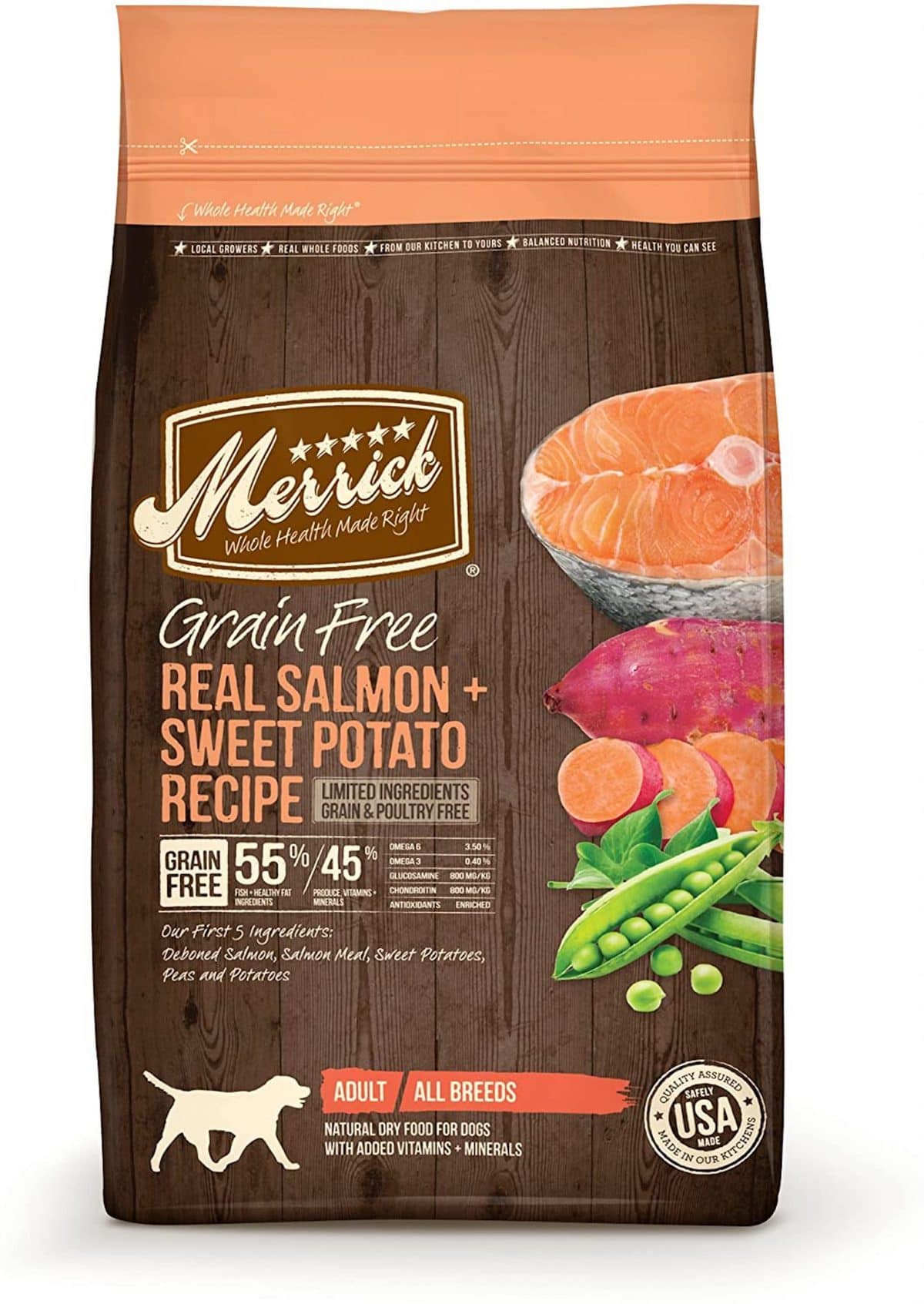
Merrick Grain Free Salmon and Sweet Potato
Delicious grain-free, fish-based recipe
Packed with meat proteins, this spaniel-friendly kibble features real salmon as the #1 ingredient along with easy-to-digest grain-free carbohydrates.
About: Merrick Grain-Free Salmon and Sweet Potato Recipe is a delicious and nutritious food, that is made with a wealth of healthy ingredients to keep your dog as healthy as possible. Made in the USA and formulated for all life stages, this food is a great option for most Cocker Spaniels.
Calories per Cup: 354
Features: The first thing most owners will notice about Merrick Grain-Free Salmon and Sweet Potato Recipe is the food’s impressive ingredient list. This recipe includes several high-quality proteins, including deboned salmon (the first listed ingredient), salmon meal, whitefish meal and deboned whitefish.
Because it is a grain-free recipe, this food relies on sweet potatoes and potatoes to provide the majority of the food’s carbohydrate content. Apples and blueberries are included to ensure maximum palatability and to provide vitamins, minerals, and antioxidants.
In addition to vitamin and mineral supplements, Merrick Grain Free is fortified with chondroitin and glucosamine (at industry-leading levels, according to the manufacturer), that will help promote joint health. Four different probiotic strains are also included to encourage proper digestion and combat intestinal upset.
PROS
Most owners were very pleased with Merrick Grain-Free Salmon and Sweet Potato Recipe, and many specifically mentioned the impressive slate of ingredients contained in the food. Most dogs seemed to find the food very palatable, and several displayed improved coat condition after switching to this food.
CONS
There weren’t many complaints about this food, although a few dogs didn’t seem to like the taste. Some owners prefer to avoid potatoes in favor of other ingredients, but there is nothing inherently wrong with recipes that include them among their ingredient lists.
Ingredients List
Deboned Salmon, Salmon Meal, Sweet Potatoes, Peas, Potatoes...,
Whitefish Meal, Natural Flavor, Canola Oil, Deboned Whitefish, Apples, Blueberries, Yeast Culture, Organic Alfalfa, Flaxseed Oil, Potassium Chloride, Salmon Oil, Salt, Minerals (Zinc Amino Acid Complex, Zinc Sulfate, Iron Amino Acid Complex, Manganese Amino Acid Complex, Copper Amino Acid Complex, Potassium Iodide, Cobalt Amino Acid Complex, Sodium Selenite), Vitamins (Vitamin E Supplement, Vitamin A Supplement, Vitamin B12 Supplement, D-Calcium Pantothenate, Vitamin D3 Supplement, Niacin, Riboflavin Supplement, Biotin, Pyridoxine Hydrochloride, Folic Acid, Thiamine Mononitrate), Choline Chloride, Yucca schidigera Extract, Dried Lactobacillus plantarum Fermentation Product, Dried Lactobacillus casei Fermentation Product, Dried Enterococcus faecium Fermentation Product, Dried Lactobacillus acidophilus Fermentation Product.
2. Taste of the Wild Appalachian Valley: Small Breed Formula
This is a sponsored placement, in which an advertiser pays a fee to be featured in this article. Learn more
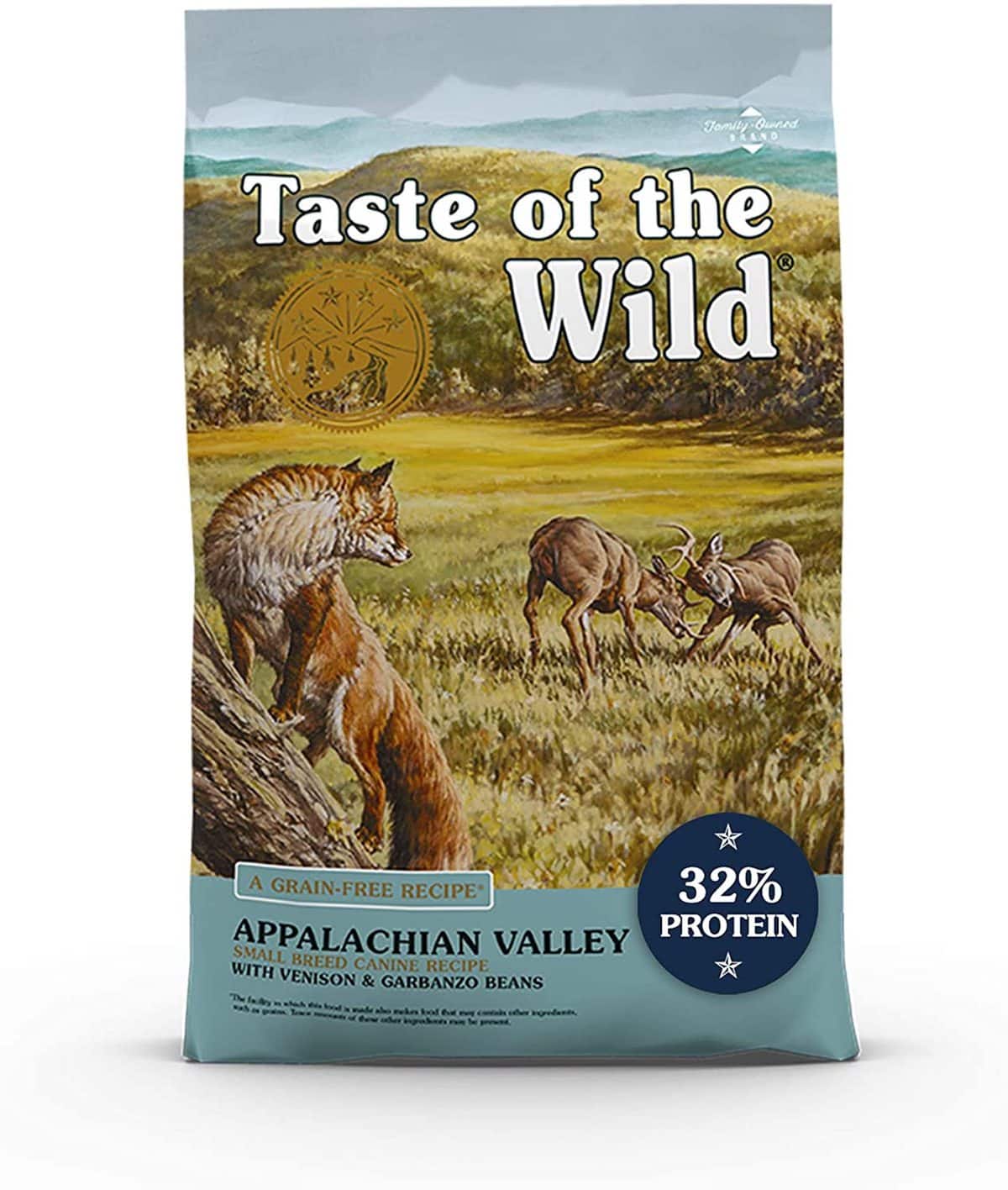
Taste of the Wild Appalachian Valley Small Breed
Delicious venison-and-garbanzo-bean-based recipe
This small size, protein-rich kibble features a variety of meaty animal proteins, including venison, lamb meal, duck meal and ocean fish meal. Plus, it’s fortified with three different probiotic strains for sensitive stomachs!
About: Taste of the Wild makes a variety of high-protein foods designed to feed your dog a diet similar to that which her ancestors would have enjoyed.
Their Appalachian Valley Small Breed Formula is an excellent choice for Cocker Spaniels, who will likely find this venison-and-garbanzo-bean-based recipe delicious.
Calories per Cup: 370
Features: Taste of the Wild’s Appalachian Valley, Small Breed Formula is a protein-rich dog food, made with a variety of healthy ingredients, including venison, lamb meal, duck meal and ocean fish meal.
As a grain-free product, this recipe primarily derives its carbohydrate content from things like garbanzo beans, peas, and lentils, rather than corn or wheat.
There aren’t many fruits and vegetables in the recipe, but it does include blueberries, raspberries, and tomatoes, which are all antioxidant-rich foods that most dogs find delicious. It is fortified with three different probiotic strains and a variety of vitamins and minerals.
PROS
Most owners rave about Taste of the Wild recipes, including their Appalachian Valley Small Breed Formula. Most dogs appear to love the taste of the food, and Cocker Spaniel owners will love that the food features a small kibble size that is perfect for their dog’s relatively small mouth and teeth. Several owners noted that their dog’s coat and skin health improved after switching to Taste of the Wild, and the included probiotics appear to promote proper elimination habits and intestinal function.
CONS
Some owners may not like a few of the ingredients in this recipe, such as canola oil and tomato pomace, but these ingredients are included in a variety of premium dog foods, and they shouldn’t cause any problems for your dog in such small quantities. Taste of the Wild does appear to make some dogs gassy, but this isn’t a giant problem.
Ingredients List
Venison, Lamb Meal, Garbanzo Beans, Peas, Lentils, Pea Protein...,
Canola Oil, Egg Product, Duck Meal, Pea Flour, Tomato Pomace, Natural Flavor, Ocean Fish Meal, Salt, Choline Chloride, Dried Chicory Root, Tomatoes, Blueberries, Raspberries, Yucca schidigera Extract, Dried Lactobacillus acidophilus Fermentation Product, Dried Bifidobacterium animalis Fermentation Product, Dried Lactobacillus reuteri Fermentation Product, Vitamin E Supplement, Iron Proteinate, Zinc Proteinate, Copper Proteinate, Ferrous Sulfate, Zinc Sulfate, Copper Sulfate, Potassium Iodide, Thiamine Mononitrate (Vitamin B1), Manganese Proteinate, Manganous Oxide, Ascorbic Acid, Vitamin A Supplement, Biotin, Niacin, Calcium Pantothenate, Manganese Sulfate, Sodium Selenite, Pyridoxine Hydrochloride (Vitamin B6), Vitamin B12 Supplement, Riboflavin (Vitamin B2), Vitamin D Supplement, Folic Acid.
3. Orijen Regional Red
This is a sponsored placement, in which an advertiser pays a fee to be featured in this article. Learn more
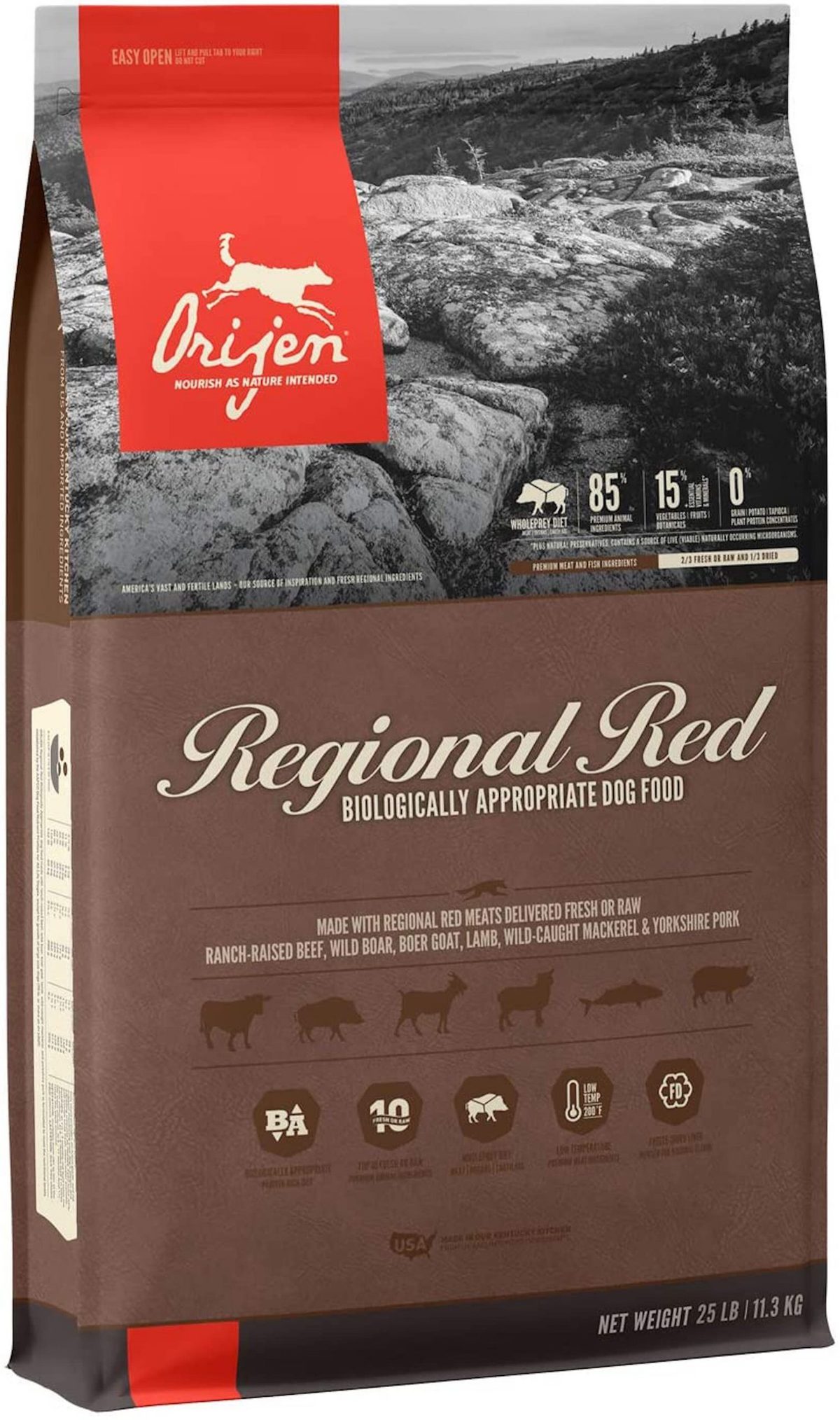
Orijen Regional Red
High-protein low-glycemic food packed with organ meats
This grain-free and meat-rich formula is packed animal proteins and raw ingredients.
About: Orijen Regional Red is a biologically appropriate dog food that is made with some of the best possible ingredients for your dog. A high-protein, low-carbohydrate recipe, Regional Red is designed to provide the best possible nutrition, while still tasting great.
Calories per Cup: 453
Features: Orijen Regional Red is absolutely stuffed with nutritious and tasty protein sources, including both fresh and dehydrated varieties. Fresh Angus beef meat is the primary protein, but the recipe also includes everything from fresh bison, boar, and lamb, to organ meats like tripe and liver.
Orijen Regional Red is a grain-free recipe, and the first carbohydrate included – red lentils — doesn’t even appear until halfway through the ingredient list. Yellow lentils, chickpeas, other legumes, and vegetables provide additional carbohydrate content.
Herring oil is included to provide omega-3 fatty acids, and one probiotic strain is also featured in the recipe, to ensure your dog digests and processes this food appropriately.
PROS
Most owners who tried Orijen were quite pleased with it, and dogs usually love the meat-rich formula. Several owners noted improvements in their dog’s energy level, coat condition and elimination habits after trying this recipe, and most like knowing that they are giving their dog a food that includes so many different protein sources.
CONS
There were a shockingly high number of complaints about Orijen Regional Red, but upon further investigation, it becomes apparent that most negative reviews relate to one-off quality-control or packaging problems. Some dogs do not digest the food well, so be sure to switch to Orijen (or any other food) gradually.
Ingredients List
Fresh angus beef meat, fresh wild boar meat, fresh plains bison meat...,
fresh or raw romney lamb meat, fresh yorkshire pork meat, fresh beef liver, fresh beef tripe, fresh whole pilchard, fresh whole eggs, fresh wild boar liver, lamb, beef, whole herring, mutton, pork, fresh lamb liver, fresh lamb tripe, whole sardine, fresh pork liver, whole red lentils, whole green lentils, whole green peas, lentil fiber, whole chickpeas, whole yellow peas, whole pinto beans, beef fat, pork fat, herring oil, beef cartilage, beef liver, beef tripe, lamb liver, lamb tripe, fresh whole pumpkin, fresh whole butternut squash, fresh whole zucchini, fresh whole parsnips, fresh carrots, fresh whole red delicious apples, fresh whole bartlett pears, fresh kale, fresh spinach, fresh beet greens, fresh turnip greens, brown kelp, whole cranberries, whole blueberries, whole saskatoon berries, chicory root, turmeric root, milk thistle, burdock root, lavender, marshmallow root, rosehips, Enterococcus faecium.
4. Instinct Original Grain-Free With Rabbit
This is a sponsored placement, in which an advertiser pays a fee to be featured in this article. Learn more
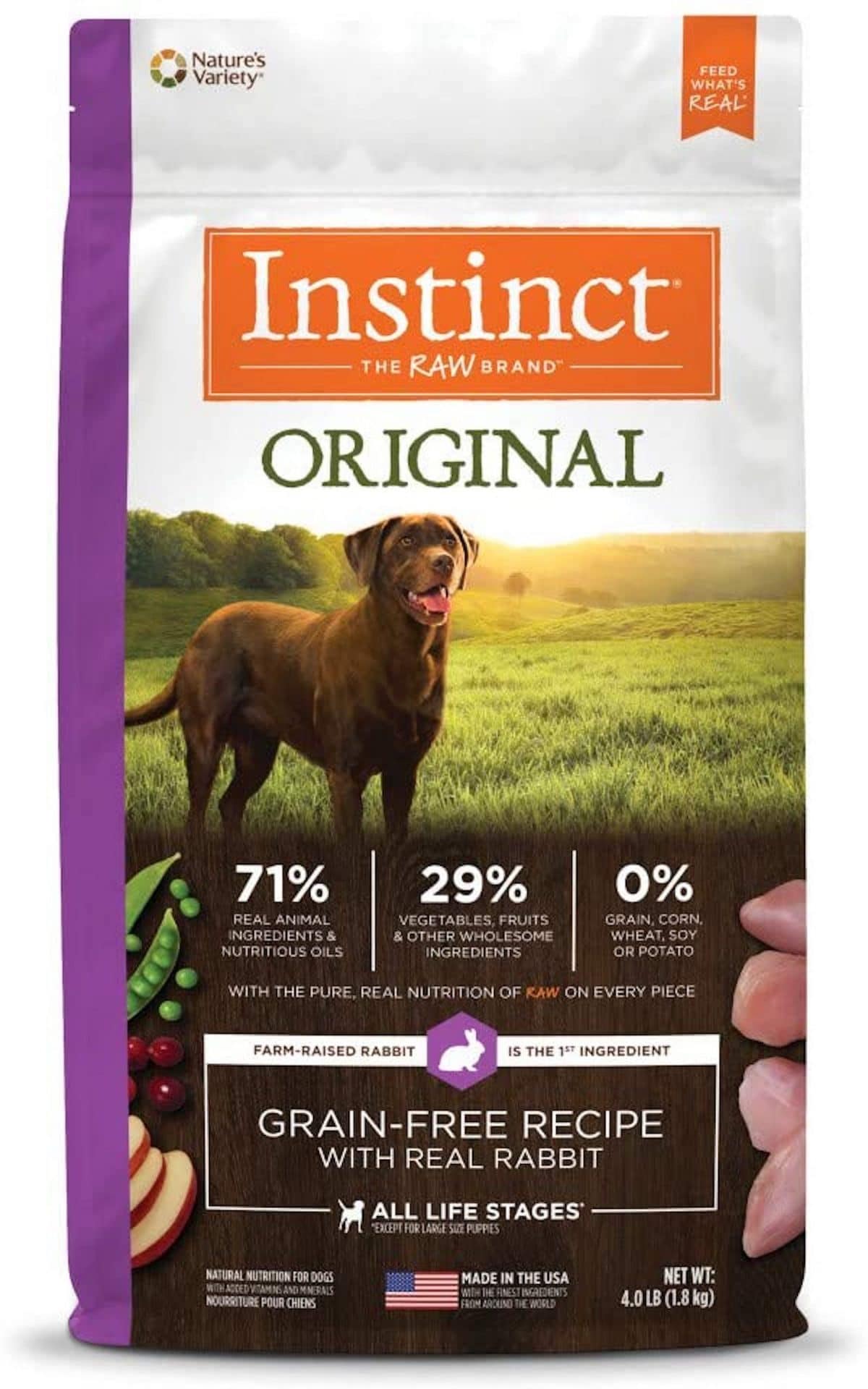
Instinct Original Grain-Free With Rabbit
Grain-free, rabbit-based recipe
This kibble contains real freeze-dried raw meats in every bite and is made without any artificial flavors, colors or additives.
About: Instinct Original is a grain-free, rabbit-based recipe that provides the kind of nutrition owners want and a taste that most dogs love. In addition to a variety of nutritious fruits, vegetables, and carbohydrates, Instinct Original contains real freeze-dried raw meats in every bite.
Calories per Cup: 524
Features: Instinct Original brandishes a very impressive and well-conceived ingredient list. Farm-raised rabbit – an ingredient that most dogs find quite tasty – begins the list, while salmon meal and menhaden fish meal provide supplemental protein content and omega-3 fatty acids.
Chickpeas and tapioca are the primary carbohydrate sources, while carrots, apples, and cranberries improve the food’s taste and provide a wealth of antioxidants, vitamins, and minerals. Several organ meats (including rabbit lung, liver, and kidney) round out the ingredient list.
No corn, wheat or soy is included in this recipe, and it is made without any artificial flavors, colors or additives. One probiotic strain is included in the recipe to encourage proper digestion.
PROS
Instinct Original enjoyed positive reviews from the majority of owners who tried it. Several owners specifically praised the ingredients (particularly the inclusion of raw meat), and most dogs seem to find the recipe perfectly palatable. Several owners reported that their pup began exhibiting better coat condition after switching to this food. Some owners complained about this food’s small kibble size, but this should be seen as a positive attribute when seeking a Cocker Spaniel food.
CONS
A small number of dogs didn’t seem to like this rabbit-based recipe, but this wasn’t a particularly common complaint. A few owners complained that their dog became sick after eating this food, but that likely resulted from switching their diet too quickly. While some owners may view the high caloric content of Nature’s Variety Instinct Original as a positive feature, those with overweight dogs may not want to provide their dog with such a rich food.
Ingredients List
Rabbit, Salmon Meal, Menhaden Fish Meal, Chickpeas...,
Canola Oil (preserved with Mixed Tocopherols and Citric Acid), Tapioca, Rabbit Meal, White Fish Meal (Pacific Whiting, Pacific Sole, Pacific Rockfish), Dried Tomato Pomace, Natural Flavor, Peas, Montmorillonite Clay, Carrots, Apples, Cranberries, Vitamins (Vitamin E Supplement, L-Ascorbyl-2-Polyphosphate, Niacin Supplement, Thiamine Mononitrate, d-Calcium Pantothenate, Vitamin A Supplement, Riboflavin Supplement, Pyridoxine Hydrochloride, Vitamin B12 Supplement, Folic Acid, Vitamin D3 Supplement, Biotin), Choline Chloride, Minerals (Zinc Proteinate, Iron Proteinate, Copper Proteinate, Manganese Proteinate, Sodium Selenite, Ethylenediamine Dihydriodide), Freeze Dried Rabbit (including Freeze Dried Ground Rabbit Bone), Potassium Chloride, Salt, Pumpkinseeds, Dried Bacillus coagulans Fermentation Product, Freeze Dried Rabbit Liver, Freeze Dried Rabbit Lung, Freeze Dried Rabbit Kidney, Rosemary Extract
5. Blue Buffalo Life Protection
This is a sponsored placement, in which an advertiser pays a fee to be featured in this article. Learn more
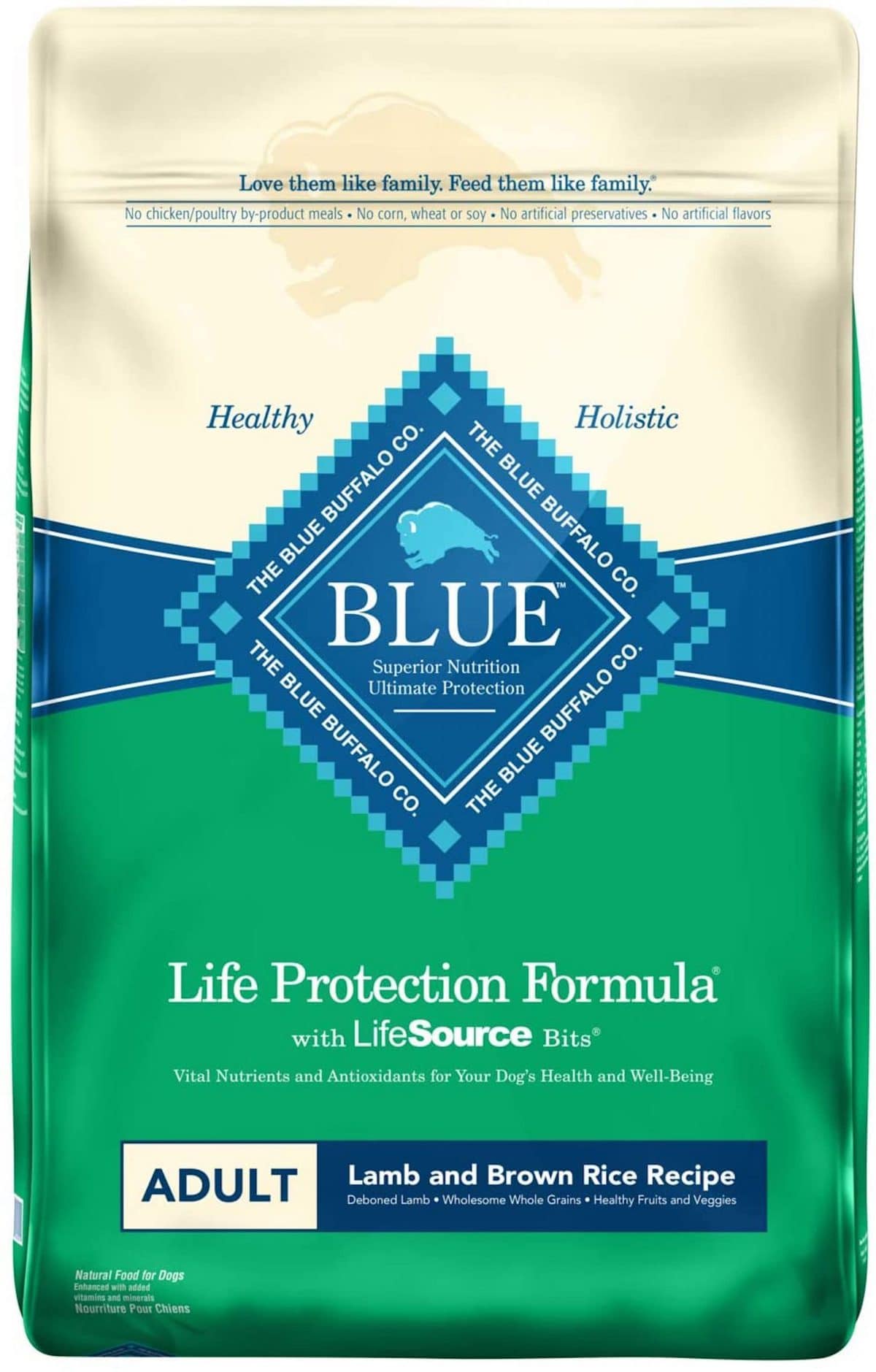
Blue Buffalo Life Protection Lamb & Brown Rice
Affordable grain-inclusive kibble with plenty of meat
Made with premium meats like lamb and turkey, this kibble has no artificial colors, flavors or preservatives.
About: Blue Buffalo Life Protection Formula is a premium dog food that features almost everything an owner could want, and it satisfies almost every requirement a good diet should. Like most other Life Protection Formulas, the Lamb & Brown Rice Recipe features Blue Buffalo’s patented LifeSource Bits, which are packed with antioxidant goodness.
Calories per Cup: 379
Features: Blue Buffalo Life Protection Formula is a lamb-based recipe, but it also includes turkey meal as a supplemental protein source. Oatmeal, whole ground barley and whole ground brown rice provide the bulk of the carbohydrate content and a not-insignificant amount of fiber.
A litany of nutritious and antioxidant-rich fruits and vegetables are included in the recipe. This not only includes common ingredients, such as carrots and blueberries but also things like dried kelp and pomegranate, which are somewhat rare among other foods.
Glucosamine is included to help support your dog’s hips and other joints, while three probiotic strains round out the recipe and ensure that your dog’s digestive system will operate as it should.
PROS
Most Blue Buffalo recipes enjoy mostly positive reviews, and their Lamb & Brown Rice Recipe is no exception. Several owners reported that their dog loved the food, and exhibited improvements in their coat and skin condition after switching to the food.
CONS
The bulk of the complaints about Blue Buffalo Lamb & Brown Rice Recipe related to problems with shipping, packaging or quality-control issues. A small number of dogs seemed to find the recipe unpalatable but seems like a relatively rare problem.
Ingredients List
Deboned Lamb, Oatmeal, Whole Ground Barley, Turkey Meal...,
Whole Ground Brown Rice, Peas, Tomato Pomace (source of Lycopene),Flaxseed (source of Omega 3 and 6 Fatty Acids),Natural Flavor, Canola Oil (preserved with Mixed Tocopherols),Alfalfa Meal, Whole Potatoes, Sunflower Oil (source of Omega 6 Fatty Acids),Whole Carrots, Whole Sweet Potatoes,Blueberries,Cranberries,Apples,Blackberries,Pomegranate,Spinach,Pumpkin,Barley Grass, Dried Parsley, Garlic, Dried Kelp, Yucca schidigera Extract, L-Carnitine, L-Lysine, Glucosamine Hydrochloride, Turmeric, Dried Chicory Root, Oil of Rosemary, Beta Carotene, Calcium Carbonate, Dicalcium Phosphate, Vitamin A Supplement, Thiamine Mononitrate (Vitamin B1),Riboflavin (Vitamin B2),Niacin (Vitamin B3),d-Calcium Pantothenate (Vitamin B5),Pyridoxine Hydrochloride (Vitamin B6),Biotin (Vitamin B7),Folic Acid (Vitamin B9),Vitamin B12 Supplement, Calcium Ascorbate (source of Vitamin C),Vitamin D3 Supplement, Vitamin E Supplement, Iron Amino Acid Chelate, Zinc Amino Acid Chelate, Manganese Amino Acid Chelate, Copper Amino Acid Chelate, Choline Chloride, Sodium Selenite, Calcium Iodate, Salt, Caramel, Potassium Chloride, Dried Yeast (source of Saccharomyces cerevisiae),Dried Lactobacillus acidophilus fermentation product, Dried Bacillus subtilis fermentation product, Dried Enterococcus faecium fermentation product.
Our Recommendation: Orijen Regional Red
Orijen Regional Red is fantastic food, which should suit most Cocker Spaniels very well – particularly those who are more active than average.
It has an utterly ridiculous list of protein sources that is unmatched by any other major competitors. It has probiotics, plenty of nutritious fruits and vegetables and most dogs seem to love the taste.
You will pay more for Orijen Regional Red than many of the other foods detailed above, but premium foods come with premium price tags. Besides, it is hard to put a price on your dog’s health and quality of life.
What have you been feeding your Cocker Spaniel? Have you found a food that suits her well and keeps her happy? We’d love to hear about it.
Let us know the brand and recipe that has worked well for you in the comments below (or just tell us your best Cocker Spaniel story – we’re suckers for a cute dog tale!).

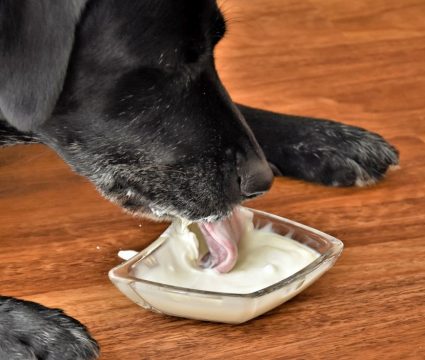






10 Comments
February 11, 2023
My Cocker Spaniel is very fussy about her food. Whatever dry or wet food you give, she will not immediately touch, though after some time, she may take very little. Have tried Hills and Royal Canin, but she turns away. However she will grab her treats in one go. What do you suggest?
February 13, 2023
Hey there, Srikumar.
Check out our article about great dog foods for picky eaters — you should find one that’ll work for your pooch there.
Best of luck!
July 7, 2020
I have had my Cocker Spaniel for almost a year. He was 4 months old when I got him on July 20, 2019.. The breeder recommended Diamond grain free, however, I have 2 cats who at the time were 1 yr/2mo and 11 mo. I was feeding my cats Taste of the Wild Rocky Mountain Feline Formula, but had recently heard about Orijen and wanted to transition them to Orijen. So when I got Riley, my Cocker, I transitioned all three to Orijen. The kitten formula for my cats and puppy for Riley. They all really loved the Orijen until about 4 months ago, when it seems that they had a meeting and decided that they didn’t want to eat it any more. So I transitioned them back to Taste of the Wild. Rocky Mountain for my cats and the Appalachian for Riley. All seem to be happy for now. As for the size of the kibble, I tried to feed Riley a different Taste of the Wild that was about the size of a nickle. He refused to eat it. He definitely prefer smaller pieces.
October 6, 2019
My pet (Luke) cocker spaniel breed is keep scratching.
What could be the reason?
Kindly advise
With regards
Srivani
October 7, 2019
Hi, Srivani.
Itchy skin can be caused by a wide variety of things. Fleas, environmental allergies, and food allergies are some of the most likely reasons for you pup’s itchy skin, so I’d start by investigating those possibilities (in conjunction with your vet).
Thanks for reading!
January 28, 2019
I have a 4 month old cocker spaniel puppie who is thriving on breeder recommended Purina Beta chicken and rice kibbles. She loves them and even accepts them as treats. She’s full of energy and has a superb glossy soft coat .
January 22, 2019
Thanks for this informative article. We just rescued a field spaniel so we look forward to trying some of these dog foods
December 28, 2018
Hi, I’ve been giving my cocker spaniel approximately: 8 months old the Royal canine puppy food but I’ve been noticing that his urine is really yellow and a very strong scent he has plenty of water so I know it’s it that I’ve been wanting to change up the food I’ve been looking into the blue buffalo but I’m scared that changing his food will upset the stomach since it’s happened before and once i move him back to royal canine he goes back to regular it’s just the Uribe color/scent that scares me do you think it’s the food?
December 28, 2018
Hard to say Genesis. You could try switching to another food slowly and see how that affects your dog’s urine. Or it might be best to just talk to your vet about it and see what he or she says.
April 26, 2018
Hello, I recently adopted a new cocker spaniel and the breeder helped me to find a good food for my new baby. And after reading your article, I think I will keep some of the points in mind especially the factors to look for in a quality dog food before buying food for my pet baby. Thank you. Cheers.